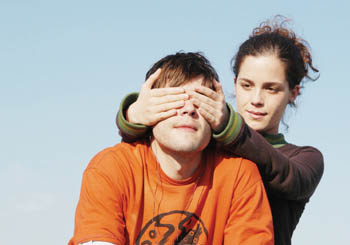![[Metroactive Movies]](/movies/gifs/movies468.gif)
[ Movies Index | Show Times | Silicon Valley | Metroactive Home | Archives ]

Waiting to See: The Latino Film Festival kicks off with the Spanish feature 'Héctor.' Original Cine The International Latino Film Festival brings new and vintage features and documentaries to San Jose THIS WEEK, I had one of those enlightening moments that really makes a career in journalism so rewarding. Checking the letters to the editor, there were far more correspondents furious about KSJO changing its format to Mexican oldies than they were complaints about the election. Never let it be said that San Jose doesn't have its priorities straight. Like the election, KSJO's format change made half the population happy. The fact that there is now mariachi where there once was Sammy Hagar signifies ongoing recognition of Mexican culture. The Latino International Film Festival, which has been running around the Bay Area this month, begins its San Jose edition on Nov. 18. The festival was spun off from a film group at San Rafael's Dominican College; today, it has sponsors like Univision and Telefutura. This year, the festival unreels 80 films in 13 Bay Area locations, as it seeks to remedy what executive director Sylvia Perel calls "the enormous need for high-quality Latino films." By Latin, the festival doesn't mean just Latin America. The festival is connected with the Malaga Film Festival, which annually selects the best movies made in Spain. The 2003 Malaga winner—Héctor by Gracia Queretaja (showing Nov. 19 at 9:15pm)—tells of a Spanish son reconnecting with his estranged Mexican father. Four of the films showing in San Jose are Mexican or Mexican-themed. These include the 2003 animated children's movie Magos y Gigantes (a.k.a. Wizards and Giants), screening Nov. 21 at 12:30pm. Un Amor Silencioso by Federico Hildago (2003; Nov. 21 at 4:45pm) tells of a romance between a Mexican woman and a Canadian professor—a romance complicated by the mother-in-law who comes to live in Montreal. Farmingville is a documentary about a murderous assault on two Mexican day-laborers seeking work in Long Island (2003; Nov. 21 at 2:15pm). The local screenings commence on a happier note with a vintage ranchera film by pioneer Mexican filmmaker Emilio "El Indio" Fernandez: El Rapto, "The Kidnapping" (1953; Nov. 18 at 6pm, followed by a reception), starring an extravagantly sombreroed Jorge Negreto and that late diva of Mexican film, Maria Felix. Fernandez made more than 30 movies, though he's best known in the United States as an actor. He played the murderous Mexican general in Peckinpah's The Wild Bunch and in real life was formidable enough to be convicted of manslaughter. We can take, under advisement, the description of an interviewer named Beatriz Reyes Navares who wrote that El Indio was "an overwhelming presence, like a Diego Rivera figure that has stepped out of a mural." Fernandez told Navares that his intention had always been nationalistic: he aimed "to create a uniquely Mexican cinema with our own actors and our own stories, without having to photograph gringos or gringas or tell stories that had nothing to do with our people." Most indie film fans remember the name of Nancy Savoca—she directed Dogfight, and thus was the director who made stars out of both River Phoenix and Lili Taylor. What isn't as widely known is that Savoca is half-Argentinian. The festival is screening her as-yet-unreleased shot-on-DV film, Dirt (Nov. 19 at 6pm), about a Salvadoran refugee who has just lost her cleaning-woman job in Manhattan because her employer is going into politics and doesn't want the potential scandal of being a known employer of illegal aliens. The closing night, Nov. 21, includes a "Noche Chicano" film, reception and exhibition, featuring Hector Cruz Sandoval's documentary KordaVision about the life and times of the photographer who took the famous picture of Che Guevara. On March 4, 1960, La Coubre, a Belgian freighter carrying arms for Castro, blew up in Havana harbor. Whether the CIA did it or not has been a matter of discussion ever since. One hundred and fifty harborside residents were immolated in the blast. At the memorial service, a Cuban fashion-photographer-turned-war-correspondent who worked under the name "Korda" (in honor of the Anglo-Hungarian filmmaking brothers) got a shot of a seething Dr. Ernesto Guevara on the podium. Some 40 years later, Korda shows the adoring Sandoval the actual spot where he took the photo that launched a million posters. (Incidentally, he used a Leica M2 with a 90 mm lens.) The dapper Korda—a good chum of both Hemingway and Castro—lived long enough to successfully sue Smirnoff for trying to put his picture of Che in one of its vodka advertisements. Fidel himself is interviewed, reminiscing about his days as a guerrilla and giving a few of his secrets for a long life. Representing younger Cubans, who might have a less enchanted view of their revolution, is ANC, a.k.a. Anonimo Consejo, the Cuban hip-hop group documented in ANC Hip Hop Revolution (Nov. 20 at 2pm). These poets are followed by a more renowned versifier in Neruda! Presente! (Nov. 20 at 6pm), a documentary on Pablo Neruda narrated by Isabel Allende.
The Latino Film Festival takes place Nov. 18 and 21 at the Mexican Heritage Plaza, Nov. 19 at Camera 12 and Nov. 20 at MACLA, all in San Jose. Call 415.454.4613 for details or check www.latinofilmfestival.org for schedule details. Tickets are $6-$12 for movies; $20-$40 for receptions and special events.
Send a letter to the editor about this story to letters@metronews.com. [ Silicon Valley | Metroactive Home | Archives ]
|
From the November 17-23, 2004 issue of Metro, Silicon Valley's Weekly Newspaper.
Copyright © Metro Publishing Inc. Metroactive is affiliated with the Boulevards Network.
For more information about the San Jose/Silicon Valley area, visit sanjose.com.